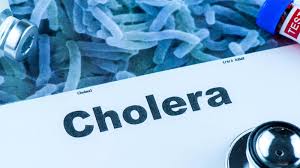BY KASE GREATNESS
CHOLERA, an infectious disease causing severe watery diarrhea, is a global health concern with a unique history. Originating from India, the disease spread through trade routes to Asia, including China and Japan, and eventually to Southern Russia. The first cholera pandemic began in 1817 and highlighted the disease’s potential to cause widespread devastation.
The primary culprit, Vibrio cholera, thrives in poor sanitation and contaminated water sources, leading to rapid outbreaks if conditions are not controlled. Nigeria’s battle with cholera began in 1970, marking the first major epidemic in the country.
Despite various efforts to improve sanitation and hygiene practices, cholera remains a persistent issue. Outbreaks are frequently linked to inadequate sanitation and contaminated water sources, creating an environment where Vibrio cholera can easily spread.
The 1970 cholera epidemic in Nigeria was exacerbated by poor sanitation conditions and contaminated water sources. These factors allowed the bacteria to spread rapidly, causing a widespread outbreak. In response, the Nigerian government established treatment centers, implemented oral rehydration therapy, and launched community awareness campaigns.
These initiatives were crucial in controlling the outbreak and preventing further transmission. During the epidemic, the government focused on improving sanitation infrastructure by upgrading water treatment facilities, implementing proper waste disposal systems, and enhancing sewage systems.
These measures were vital in preventing water contamination and reducing the spread of cholera. Upgraded water treatment facilities ensured effective removal of harmful bacteria, while enhanced waste disposal and sewage systems prevented the mixing of sewage with clean water sources.
Despite past efforts, recent cholera outbreaks in Nigeria have highlighted ongoing public health challenges. Factors such as inadequate sanitation, poor hygiene practices, and limited access to clean water continue to contribute to the spread of cholera.
The recent outbreak came as a shock, emphasizing the need for sustained and intensified efforts to combat the disease. Cholera remains a global health threat, particularly in regions with poor sanitation and limited access to clean water.
The World Health Organization (WHO) estimates that there are approximately 1.3 to 4 million cases of cholera each year, resulting in 21,000 to 143,000 deaths worldwide. Recent outbreaks in countries like Yemen, Haiti, and parts of Africa have underscored the urgent need for coordinated global action. In addition to Nigeria, other African countries have faced significant cholera outbreaks. In 2020, Sudan experienced a major outbreak, with thousands of cases reported.
The outbreak was attributed to flooding, which contaminated water sources and created ideal conditions for the spread of Vibrio cholera. The government, with support from international organizations, launched emergency response measures, including setting up treatment centers, distributing clean water, and conducting vaccination campaigns. Cholera’s persistence as a global health threat underscores the urgent need for coordinated international action. Addressing the root causes of cholera requires a multifaceted approach, focusing on improving water, sanitation, and hygiene (WASH) infrastructure, enhancing disease surveillance, and ensuring rapid response capabilities.
Investing in water, sanitation, and hygiene infrastructure is critical to preventing cholera outbreaks. This includes building and maintaining water treatment facilities, improving waste disposal systems, and ensuring access to clean water.
Community-based interventions, such as promoting handwashing with soap and safe food handling practices, are also essential.
Effective disease surveillance systems are crucial for early detection and response to cholera outbreaks. This involves strengthening laboratory capacity to diagnose cholera, training health workers to recognize and report cases, and establishing robust data collection and analysis systems.
Rapid identification of outbreaks enables timely intervention and can prevent the spread of the disease. Cholera vaccines can be a valuable tool in preventing outbreaks, particularly in high-risk areas. Vaccination campaigns can provide immediate protection to vulnerable populations while longer-term WASH improvements are implemented. Integrating cholera vaccination into routine immunization programs can also help sustain immunity in at-risk communities.
Community engagement and education are vital components of cholera prevention and control. Awareness campaigns can educate communities about the importance of cleanliness, safe water sources, and proper sanitation practices.
By empowering communities with knowledge and resources, the impact of cholera outbreaks can be minimized. Cholera remains a significant public health challenge in Nigeria and globally.
The persistent threat of cholera underscores the need for sustained and coordinated action to address the root causes of the disease. By investing in water, sanitation, and hygiene infrastructure, enhancing disease surveillance, ensuring rapid response capabilities, and promoting community engagement and education, we can prevent cholera outbreaks and save lives. The recent cholera outbreaks in Nigeria and other countries serve as a reminder of the urgent need for global action to combat this preventable disease.


